 Derek Mitchell (L), U.S. principal deputy assistant secretary of defense for Asian and Pacific Security Affairs, speaks at a symposium in Seoul on Jan. 18. (Yonhap)
Derek Mitchell (L), U.S. principal deputy assistant secretary of defense for Asian and Pacific Security Affairs, speaks at a symposium in Seoul on Jan. 18. (Yonhap) Yonhap News
N. Korea nurtured growing bond among S. Korea, U.S., Japan: official
N. Korea nurtured growing bond among S. Korea, U.S., Japan: official SEOUL, Jan. 18 (Yonhap) -- A senior U.S. defense official said Tuesday that North Korea's warlike behavior was a catalyst for stronger ties to develop among some of the communist regime's nearest neighbors, as South Korea, the United States and Japan sought joint measures against North Korean threats.
"Certainly, North Korea has played a central role in facilitating the development of trilateral cooperation over the years," Derek Mitchell, principal deputy assistant secretary of defense for Asian and Pacific Security Affairs, said during a trilateral foreign policy symposium in Seoul that brought together officials and experts from the three allies.
N. Korea nurtured growing bond among S. Korea, U.S., Japan: official
N. Korea nurtured growing bond among S. Korea, U.S., Japan: official SEOUL, Jan. 18 (Yonhap) -- A senior U.S. defense official said Tuesday that North Korea's warlike behavior was a catalyst for stronger ties to develop among some of the communist regime's nearest neighbors, as South Korea, the United States and Japan sought joint measures against North Korean threats.
"Certainly, North Korea has played a central role in facilitating the development of trilateral cooperation over the years," Derek Mitchell, principal deputy assistant secretary of defense for Asian and Pacific Security Affairs, said during a trilateral foreign policy symposium in Seoul that brought together officials and experts from the three allies.
Trilateral coordination began in the 1990s with a focus on North Korea's nuclear and missile development, but the country's recent erratic behavior has added greater momentum to three-way activities, Mitchell said, blaming Pyongyang for the deadly sinking of a South Korean warship last March and the unprovoked shelling of a southern border island in November. Fifty South Koreans died in the two incidents.
"We have demonstrated repeatedly that far from dividing us, it has only strengthened our mutual resolve, unity and common purpose," he said.
The assistant secretary, however, stressed that trilateral cooperation should not be limited to security concerns in relation to North Korea, and called for constructive joint efforts in promoting sustainable economic development and energy production worldwide, preventing pandemic flu outbreaks and fighting piracy off the coast of Africa, among other issues.
In support of such ideas, one Japanese delegate proposed a venue for such three-way cooperation to reach higher levels.
"Some of the issues that the three countries could cooperate ... may include, first, hosting a trilateral foreign and defense ministers' meeting -- so-called 2+2+2," said Yasuhisa Shiozaki, an opposition party member of the Japanese House of Representatives.
His suggestion comes a week after the South Korean and Japanese defense chiefs agreed to work toward a military cooperation agreement during a meeting in Seoul, paving the way for the first pact of its kind since Tokyo's brutal occupation of Korea in the early 20th century.
Shiozaki stressed that South Korea and Japan will face an "existential threat" if North Korea continues to develop nuclear weapons under the protection of its chief ally and benefactor China.
hague@yna.co.kr
(END)
"We have demonstrated repeatedly that far from dividing us, it has only strengthened our mutual resolve, unity and common purpose," he said.
The assistant secretary, however, stressed that trilateral cooperation should not be limited to security concerns in relation to North Korea, and called for constructive joint efforts in promoting sustainable economic development and energy production worldwide, preventing pandemic flu outbreaks and fighting piracy off the coast of Africa, among other issues.
In support of such ideas, one Japanese delegate proposed a venue for such three-way cooperation to reach higher levels.
"Some of the issues that the three countries could cooperate ... may include, first, hosting a trilateral foreign and defense ministers' meeting -- so-called 2+2+2," said Yasuhisa Shiozaki, an opposition party member of the Japanese House of Representatives.
His suggestion comes a week after the South Korean and Japanese defense chiefs agreed to work toward a military cooperation agreement during a meeting in Seoul, paving the way for the first pact of its kind since Tokyo's brutal occupation of Korea in the early 20th century.
Shiozaki stressed that South Korea and Japan will face an "existential threat" if North Korea continues to develop nuclear weapons under the protection of its chief ally and benefactor China.
hague@yna.co.kr
(END)

![[URGENT PLEA: In Update] EMERGENCY in GANGJEONG Since AUG. 24, 2011](http://2.bp.blogspot.com/-3iz8k-USXVY/TlmRYhhIYtI/AAAAAAAAL2c/9dbF85ZIkIs/s227/jejusit.jpg)



![[Solidarity from Japan for the Jeju] 253 individuals and 16 groups/organizations](http://2.bp.blogspot.com/_gnM5QlRx-4c/TR_YeNVE1yI/AAAAAAAAHWQ/ARyf6oQN0S0/S227/jeju_12_10j.jpg)
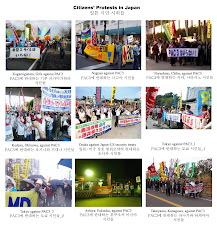
![[Translation] Korean organizations' statement: Immediately cancel the joint ROK-US drill Nov 26](http://2.bp.blogspot.com/_gnM5QlRx-4c/TPOE8VKXHFI/AAAAAAAAGlM/8lryt-8sFjc/S227/1.jpg)
![HOT! [Hankyoreh Hani TV] Beneath the Surface: the investigation into the sinking of the Cheonan](http://4.bp.blogspot.com/_gnM5QlRx-4c/TOI83qht8aI/AAAAAAAAGXU/22SW6Q5ntV8/S227/HaniTV%2BCheonan.gif)



![[Translation]Statement against illegal inspection and unjust lay-off by the Kunsan USAFK!(Nov_2010)](http://4.bp.blogspot.com/_gnM5QlRx-4c/TOPLsVkZMqI/AAAAAAAAGZs/3YnnckIyAaY/S227/gunsan%2Bprotest.gif)
![[Translation] Korean organizations' statement against dispatching special force to the UAE on Nov.](http://4.bp.blogspot.com/_gnM5QlRx-4c/TOP95zHXlCI/AAAAAAAAGak/E0Ug1XtUFfM/S227/antiwarpeace.jpg)
![[Translation] Stop, Joining MD!: South Korean activists' statement and writing on Oct. 25, 2010](http://3.bp.blogspot.com/_gnM5QlRx-4c/TOP7Es4_2sI/AAAAAAAAGac/eWVMPD-U4p0/S227/StopMD.jpg)
![[In Update] People First, NO G-20 (Nov. 6 to 12, Korea)](http://2.bp.blogspot.com/_gnM5QlRx-4c/TJd53XBzHlI/AAAAAAAAFQo/ldO9JPE3eqo/S227/left21_G20.jpg)
![[International Petition] Stop US helipad plan in Okinawa to save great nature](http://4.bp.blogspot.com/_gnM5QlRx-4c/TKC2AHRNzBI/AAAAAAAAFUo/yGWXODTw_uM/S227/yanbaru_w.jpg)

![[Global Network] against the first launch of Quasi-Zenith Satellite, Japan, on Sept. 11, 2010](http://4.bp.blogspot.com/_gnM5QlRx-4c/TIowa1boy4I/AAAAAAAAFDI/82rAi98uq-c/S227/Qzss-45-0_09.jpg)

![[In update] Some collections on the Koreans’ protests against the sanction & war on Iran](http://4.bp.blogspot.com/_gnM5QlRx-4c/TJMvke6t8zI/AAAAAAAAFO4/tamQ8LUnOOA/S227/No+Sanction+on+Iran.jpg)
![[Three International Petitions] to End the Korean war and peace treaty(or peace resolution)](http://1.bp.blogspot.com/_gnM5QlRx-4c/THef7bzWxYI/AAAAAAAAE44/wwdzSDfYhdw/S227/border.jpg)
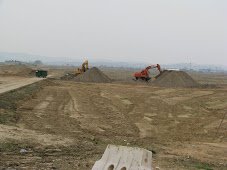


![[Collection of Documents] No Base Learning and Solidarity Program_Korea(June 14 to 20, 2010)](http://1.bp.blogspot.com/_gnM5QlRx-4c/TCTvVuN8NeI/AAAAAAAAEek/8vBJVaHdk10/S227/No-Base-banner.jpg)
![Site Fwd:[John Hines] A U.S. Debate coach’s research trip on the Issues of Korea](http://3.bp.blogspot.com/_gnM5QlRx-4c/TINCO36mzzI/AAAAAAAAE_w/Rds12NcBOXM/S227/Jeju-Peace-Tour.jpg)


![[News Update] Struggle Against the Jeju Naval Base since Jan. 18, 2010](http://1.bp.blogspot.com/_gnM5QlRx-4c/S1vvWaP25uI/AAAAAAAACkg/QvpW1tgOlKM/S226/scrum1.jpg)


![[Urgent] Please spread the Letter!: There was no Explosion! There was no Torpedo! (May 26, 2010)](http://4.bp.blogspot.com/_gnM5QlRx-4c/S_9JmsKEU7I/AAAAAAAAEP8/sAWjSPqxzUI/S227/grounded.jpg)
![Text Fwd: [Stephen Gowans]The sinking of the Cheonan: Another Gulf of Tonkin incident](http://1.bp.blogspot.com/_gnM5QlRx-4c/TAL_FtYKQ-I/AAAAAAAAERE/NEEMijiEcRM/S227/lee-myung-bak.jpg)
![[Japan Focus]Politics in Command: The "International" Investigation into the Sinking of the Cheonan](http://1.bp.blogspot.com/_gnM5QlRx-4c/TBMJ2syJzyI/AAAAAAAAEZU/uTYZccU5vyk/S227/wen_jiabao_and_lee_myungbak.png)
![[Japan Focus] Who Sank the SK Warship Cheonan? A New Stage in the US-Korean War and US-China](http://2.bp.blogspot.com/_gnM5QlRx-4c/S_iQ2vE5ZpI/AAAAAAAAEOU/Oo1SPcAe8FE/S227/buoy_map.gif)
![[Updated on 12/13/10] [Translation Project] Overseas Proofs on the Damages by the Military Bases](http://4.bp.blogspot.com/_gnM5QlRx-4c/S-qSj59gPLI/AAAAAAAAEGM/mwjlFtPE-jo/S227/missile.jpg)
![[International Petition] Close the Bases in Okinawa](http://3.bp.blogspot.com/_gnM5QlRx-4c/S8-z3DYNwNI/AAAAAAAADo4/OswTSchK09M/S227/2.jpg)

![[In Update]Blog Collection: No Korean Troops in Afghanistan](http://4.bp.blogspot.com/_gnM5QlRx-4c/SwnlLD9IewI/AAAAAAAAB9E/oUPssnpNidA/S226/No-Troops-to--Afghanistan.jpg)
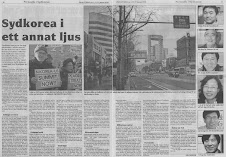

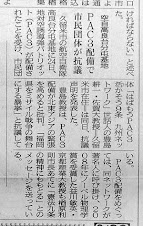

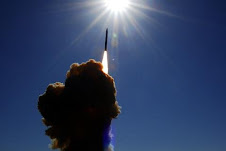



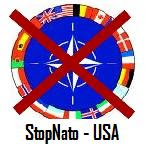


No comments:
Post a Comment